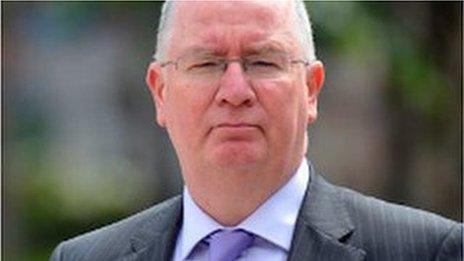UK must pay for Troubles killings investigations says European official
- Published

Nils Muiznieks said the government should be conducting effective, independent and reasonably prompt investigations into the killings
A European official has said the government should pay for investigations of killings by soldiers and police during the Troubles.
The Council of Europe's commissioner for human rights said budget cuts cannot be used as an excuse for not upholding the rule of law.
More than 300 people were killed by the security forces in Northern Ireland.
Nils Muiznieks said the government is currently breaching the European Convention of Human Rights.
Nils Muizneik said the government should be conducting effective, independent and reasonably prompt investigations into the killings
He said they were doing so by not conducting effective, independent and reasonably prompt investigations into the killings.
"Article two, the right to life, is one of the core rights," he told the BBC.
"It involves not only the state's responsibility to protect people from unlawful death, but also the responsibility to investigate effectively the circumstances of the death and punish those responsible. It is an absolute obligation."
As one of 47 members of the Council of Europe, the UK has signed up to the Convention on Human Rights.
The European Court has previously ruled that the British government had failed to comply with its legal obligations.
In response, the government put forward a package of measures it said fulfilled its legal duties.
The government points to the work of the Historical Enquiries Team, the office of the Police Ombudsman and inquests in Coroner's courts as evidence of its commitment to investigating the past.
However, critics and campaign groups say, that in reality, the investigation into killings by soldiers and police officers has virtually ground to a halt.
The HET has ceased conducting investigations and will cease to exist from the end of the year. Investigations by the police ombudsman into some highly controversial killings have been delayed because of budget cuts. A lack of resources has also led to long delays in inquests.
'Cannot wash its hands'
"I'm concerned. I think far too long a period has passed before people have received justice and information about the fate of their loved ones and about the fate of these cases," Mr Muiznieks said.
"It is clear that budgetary cuts should not be used as an excuse to hamper the work of those working for justice. Westminster cannot say 'well we will let the Northern Irish Assembly deal with this, this is under their jurisdiction'.
"The UK government cannot wash its hands of the investigations, including funding of the investigations. These are the most serious human rights violations.
"Until now there has been virtual impunity for the state actors involved and I think the government has a responsibility to uphold its obligations under the European Convention to fund investigations and to get the results.
"The issue of impunity is a very, very serious one and the UK government has a responsibility to uphold the rule of law. This is not just an issue of dealing with the past, it has to do with upholding the law in general."
In a statement released on Thursday, a Northern Ireland Office spokesperson said the UK government has a "strong track record in upholding human rights, and takes its human rights obligations extremely seriously".
"We are working assiduously on a range of processes under way which relate to Northern Ireland's past, including very extensive disclosure exercises," the statement added.
"Developing a fresh approach to Northern Ireland's troubled past remains an issue that needs to be resolved as part of Northern Ireland's peace and political process.
"The government is currently engaged in intensive talks with Northern Ireland's political leaders and the Irish government on a range of matters including how to approach the legacy of the past. The Secretary of State believes that these talks provide a crucial opportunity to address this pressing issue."
The commissioner was in Belfast to make the keynote address at a conference organised by the Ulster University.
Other speakers included Attorney General John Larkin QC and Police Ombudsman Dr Michael Maguire.
Campaign groups and lawyers will scrutinise the commissioner's comments closely.
There has been much talk in recent months about the impact of budget cuts on dealing with the past.
It has been said that policing the present has to take precedence over policing the past.
Mr Muiznieks's comments may make it more likely that that approach will be challenged in the European Court.
- Published23 January 2013

- Published16 July 2013
